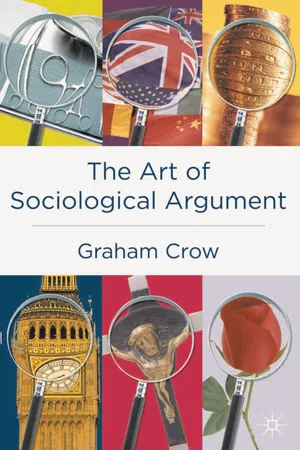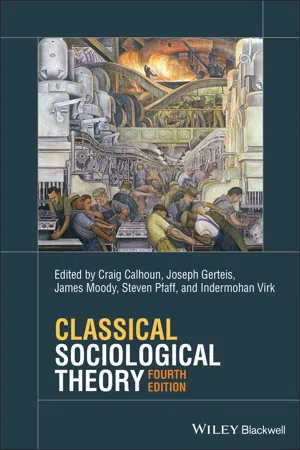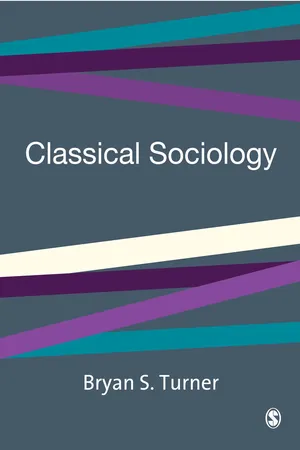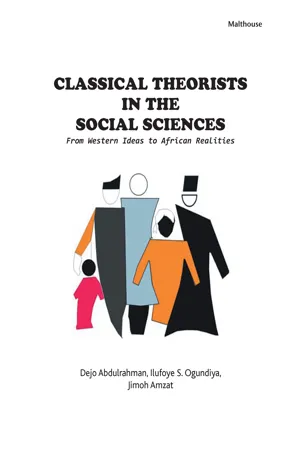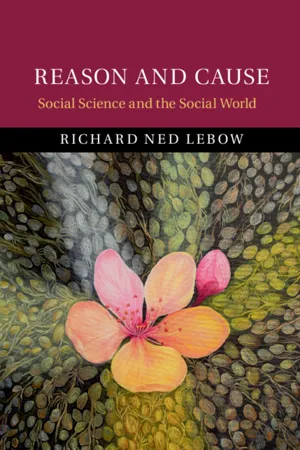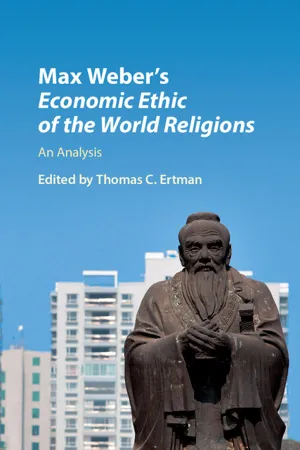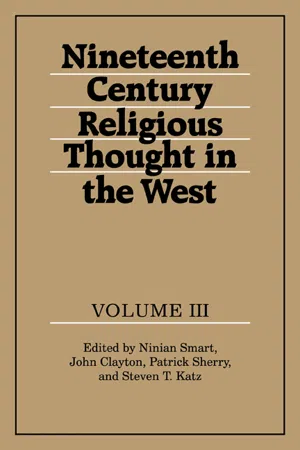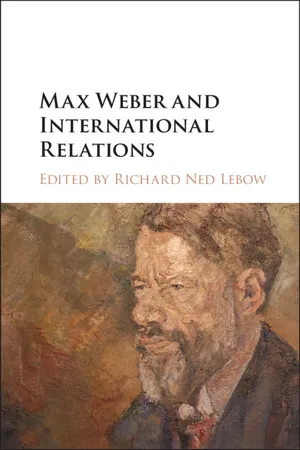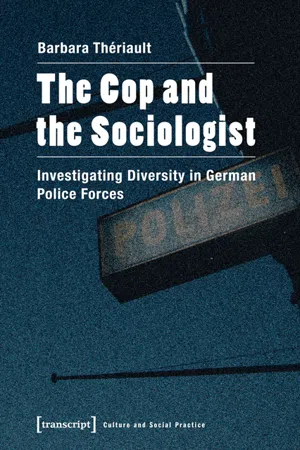Social Sciences
Max Weber Sociology
Max Weber, a prominent figure in sociology, emphasized the significance of understanding social action and its subjective meanings. He introduced the concept of the "ideal type" as a method for analyzing and comparing social phenomena. Weber also explored the relationship between religion, economy, and society, contributing to the development of sociological theory and methodology.
Written by Perlego with AI-assistance
Related key terms
1 of 5
11 Key excerpts on "Max Weber Sociology"
- eBook - PDF
- Graham Crow(Author)
- 2017(Publication Date)
- Red Globe Press(Publisher)
4 Max Weber: sociology as the science of interpretive understanding Introduction and overview Max Weber was a contemporary of Durkheim. He was born on 21 April 1864 and died aged 56, of pneumonia, on 14 June 1920. He lived in Germany and was fervently nationalistic, but was at the same time fasci-nated by social arrangements in other countries and studied them exten-sively in order to produce writings in comparative sociology that have never been matched in terms of scope or complexity. He was particularly struck by what he learned from his visit to the USA in 1904 that followed a prolonged period of mental illness that had prevented him from work-ing for several years. The breadth of his intellectual interests is indicated by the range of issues that captured his attention during his 3-month spell in America; according to Gerth and Mills, these included ‘labor problems, the immigrant question, problems of political management – especially of municipal government – all expressions of the “capitalist spirit”, the Indian question and its administration, the plight of the South, and the Negro prob-lem’ (1970: 16). Aspects of these experiences were fed into his (and, arguably, sociology’s) most famous work, The Protestant Ethic and the Spirit of Capitalism (1905), in which he developed a characteristically controver-sial line of argument about the contribution of religion in the making of the modern economic order. His training as a historian gave him a profound sense of the distinctiveness of the modern world and of the seemingly irresistible force with which it was developing. His key concept of ‘rationalization’ captured his ambiguous feelings about this process which simultaneously impressed him by its power to transform social and economic relations yet troubled him because of the threat that it posed to the values that he held dear. The visit to America provided Weber with a stark sense of the direction that modern societies were taking. - eBook - ePub
- Craig Calhoun, Joseph Gerteis, James Moody, Steven Pfaff, Indermohan Virk, Craig Calhoun, Joseph Gerteis, James Moody, Steven Pfaff, Indermohan Virk(Authors)
- 2022(Publication Date)
- Wiley-Blackwell(Publisher)
Part V The Sociological Theory of Max Weber Introduction to Part V- 22 Objectivity in Social Science
- 23 Basic Sociological Terms
- 24 The Protestant Ethic and the Spirit of Capitalism
- 25 The Distribution of Power within the Political Community: Class, Status, Party
- 26 The Types of Legitimate Domination
- 27 Bureaucracy
Introduction to Part V
This section is devoted to the work of Max Weber (1864–1920). Along with Marx and Durkheim, Weber stands as one of the central figures of sociological theory. Weber and Durkheim were part of the same generation of turn-of-the-century European thinkers who effectively founded sociology as a serious, and scientific, endeavor. Weber was only a few years younger than his French counterpart, but he was a very different theorist in both style and substance. Although Weber most likely had some knowledge of Durkheim’s work, he made only a few general remarks about the “organic school” and he never mentioned Durkheim by name.Compared with Marx and Durkheim, Weber’s approach was more individualist in method, and more cultural in orientation. Weber’s individualism was particularly striking in his methodological essays. Weber insisted that the object of sociological analysis should be the action of individuals, insofar it is oriented toward others. Weber certainly did not ignore collective actors or institutions, but his analysis of these social formations was linked to the behavior of the individuals that come under their influence. This set him apart particularly from Durkheim, who argued for the social collective as the unit of analysis. Weber was also profoundly interested in the cultural orientations of social actors. For Weber, ideas and value orientations – religious, political, economic, and aesthetic – are central to sociological analysis because they motivate action. Where Marx held that ideas are shaped material conditions, Weber maintained that the reverse might also be true: very different cultural orientations to work can lead to different forms of economic behavior. - eBook - PDF
- Bryan S Turner(Author)
- 1999(Publication Date)
- SAGE Publications Ltd(Publisher)
CHAPTER 4 MAX WEBER ON ECONOMY AND SOCIETY Introduction: Approaching Max Weber It is common to refer to concepts which are the subject of endless dispute as ‘essentially contested’ (Gallie, 1955–6). We might usefully extend the idea to talk about ‘essentially contested authors’, that is authors the inter-pretation of whom gives rise inevitably and endlessly to controversy. Max Weber (1864–1920) is pre-eminently such an author. In recent years there has been a great revival of interest in Weber and Weberian sociology, but we do not appear to be anywhere near a scholarly consensus about the importance or meaning of his work. Weber has been attacked as a reac-tionary prophet of despair, as a bourgeois sociologist whose views on dom-ination were part of the background of fascism, as one of the greatest minds of the twentieth century, or as a philosopher of modernity whose views on rationalization prepared the way towards the current dispute between modernists and postmodernists. These disputes over the meaning of Weber’s work are ironic, since Weber regarded the interpretation of meanings which actors attach to social action as an essential aspect of soci-ology as a science. For Weber, sociology was interpretative sociology ( ver-stehende soziologie ). In interpreting Weber, there is the problem of whether Weber’s work contradicts itself, namely whether Weber’s own method-ological writings are undermined by his substantive research (Scaff, 1984; Turner, 1974). There is the deeper question of whether Weber the person contradicts his work. The aim of this chapter is to consider these changing interpretations of Weber’s sociology as an appreciation of the enduring merits of Hans Gerth and C. Wright Mills’s introduction to Weber (Gerth and Mills, 1948). Their selections and translations from Weber remain one of the most balanced introductions to Weber, in English, which we possess. - eBook - PDF
Classical Theorists in the Social Scienc
From Western Ideas to African Realities
- Dejo Abdulrahman(Author)
- 2023(Publication Date)
- Malthouse Press(Publisher)
Weber, however, believed that one could use the mental constructs of the utopia as a benchmark for understanding the social world by comparing it with the real. The outcome of such comparison, namely, why the real world varies from the ideal type, forms the Max Weber and Emergence of Interpretive Sociology 237 basis of a sociological investigation in which process new problems are pursued and truths discovered which open up new points of view. With roots in philosophy and economic theory, the concept of ideal type as developed by Weber was not based on moral principles. Instead, it was borne out of rationality and logical reasoning of the social scientist. Weber argued that every social phenomenon has an ideal type, which is not necessarily amenable to empirical evidence or explainable by universal laws. The ideal type is an abstraction that provides adequate linguistic tool and procedure for analysing particular behaviour within its peculiar contexts. As noted by Abraham and Morgan (2004), Weber never claimed the ideal type to exhaust every conceivable empirical structure completely. He recognized that social structures are too complex to be approached with a single universalistic criterion as practiced in the natural sciences. His criticism of both naturalistic and socio-cultural positivism is formed on this basis, that socio-historical life of mankind is too multifarious to be reduced to a single analytical dimension. Theory of Bureaucracy The advent of modern industrial society and its associated social changes: development of money economy, quantitative development and qualitative changes in administrative tasks all led to the increased complexity of social life and social organization. The complexities, as they were, posed enormous administrative challenges, especially in work organizations. - eBook - PDF
- Syed Farid Alatas, Vineeta Sinha(Authors)
- 2017(Publication Date)
- Palgrave Macmillan(Publisher)
7 Weber’s thinking on Verstehen as applied to the study of social phenomena was an extension of the German interest in herme- neutics, the discipline concerned with the interpretation of the meaning of texts as intended by the author. What Weber did was to extend this idea of interpretation to the study of social action and human interac- tion. This method of interpretation placed the human sciences at an advantage over the natural sciences, for it enables us to ‘accomplish something which is never attainable in the natural sciences, namely the subjective understanding of the action of the component individuals’. 8 Weber was not only interested in the meaning of social action but also the causal explanation of its course and consequences. Far from having a one-way causal explanation, Weber was committed to the idea of multi- ple causality. For example, in his study of the role of Protestantism in the development of modern capitalism, Weber was careful to point out that it was necessary to clarify the extent to which religious as opposed to other factors accounted for the development of material culture. 9 5 Max Weber, Economy and Society: An Outline of Interpretive Sociology. 2 Vols. G. Roth, & C. Wittich (eds.), (Berkeley, Los Angeles & London: University of California Press, 1978), 4. 6 Weber, Economy and Society, 44. 7 Weber, Economy and Society, 4; Sam Whimster, ed., The Essential Weber: A Reader (London: Routledge, 2004), 412. 8 Weber, Economy and Society, 15. 9 Max Weber, The Protestant Ethic and the Spirit of Capitalism, trans. Talcott Parsons (New York: Charles Scribner’s Sons, 1958), 91–2, cited in George Ritzer, Sociological Theory, (New York: Alfred A. Knopf, 1983), 127. 116 S.F. Alatas One of Weber’s most important methodological tools is the ideal type. The ideal type is an abstract, hypothetical concept constructed by the scholar to use for the systematic study of empirical phenomena. - eBook - PDF
Reason and Cause
Social Science and the Social World
- Richard Ned Lebow(Author)
- 2020(Publication Date)
- Cambridge University Press(Publisher)
Sociologists sought more complex and less determinate explanations that recognized the importance of material conditions and ideas as well as agency. Max Weber was the most inter- esting and influential of the sociologists when it came to probing the meaning of cause. Weber and Knowledge Talcott Parsons studied with Alfred Weber in Heidelberg and was deeply drawn to his brother’s writings. He incorrectly represented Weber as a structural-functionalist, just as Edward A. Shils, H. H. Gerth, and C. Wright Mills would, with no more justification, depict him as a positivist. 42 Frederick Beiser insists that Weber is a neo-Kantian and that the philosophy of Windelband, Rickert, and Lask “found its ultimate fulfilment in Weber’s methodology.” 43 Guy Oakes singles out Rickert for attention, arguing that Weber’s conceptual vocabulary is largely drawn from his work. 44 Fritz Ringer argues that Weber was neither a positivist nor a neo-idealist but what he calls a “causalist.” The major influences on him, he contends, were Karl Menger, Georg Simmel, Johannes von Kries, and Gustav Radbruch. 45 Weber is open to so many interpretations in part because he drew on multiple scholars and traditions to formulate his approach to knowledge. Max Weber 203 Elsewhere, I situate it in his response to controversies between historicists and positivists, and historicists and neo-Kantians. Weber sought to build on these traditions while finessing their drawbacks and limitations. 46 His approach is best understood as a response to these ongoing controversies in German history and social science. 47 He developed compelling cri- tiques of both schools but acknowledged their distinctive contributions to the study of history, economics, and politics. The second controversy, which receives little attention in the English-speaking world, pitted neo- Kantians against historicists. Here too, Weber borrowed heavily from both traditions. - eBook - PDF
- Thomas C. Ertman(Author)
- 2017(Publication Date)
- Cambridge University Press(Publisher)
He saw the roots of these innovations in pre-Exilic Jewish prophecy, in the Pauline mission, and in the revolutions in outlook and conviction of ascetic Protestantism during the sixteenth and seventeenth centuries. Only when these two “streams”—the institutional and the intellectual or cultural-mental—flowed together did they produce modern Occidental culture. In summary, Max Weber’s approach to the sociology of religion is extremely complex, and it produces interesting results, even if they are controversial among today’s historians. What is true of his approach to the sociology of religion also applies to his sociological approach in general. In all of our attempts to recognize cultural phenomena in their singular- ity and to explain their emergence, we must pursue a two-sided multilevel approach, applying both a comparative and a developmental history per- spective. And this is true quite independently of the question as to whether the identifications and causal attributions that Max Weber presented in 32 This singular Western path of development has been described in detail in Wolfgang Schluchter, Religion und Lebensführung, 2 vols (Frankfurt am Main: Suhrkamp, 1988), ch. 10, and Schluchter, Handlung, ch. 7. On the role of the Middle Ages in Max Weber’s explanatory approach, see also Randall Collins, Weberian Sociological Theory (Cambridge: Cambridge University Press, 1986), ch. 3 (“The Weberian Revolution of the High Middle Ages”). In addition, historians refer to the significance of the agrarian revolution for the Occident’s dynamic development. Wolfgang Schluchter 60 6 0 his Sociology of Religion are still valid today, after nearly 100 years. 33 In all fields—in sinology, Indology, and biblical scholarship—research has moved on, of course. Much of what seemed like certain knowledge in Weber’s day is out-of-date today. - Ninian Smart, John Clayton, Patrick Sherry, Steven T. Katz(Authors)
- 1988(Publication Date)
- Cambridge University Press(Publisher)
56 The structure of Weber's sociology of religion may be most fruitfully approached in terms of his historical-evolutionary perspective on the growth of, divergence between and — in part — transformation of the major 'higher' religions. There are four major components in that perspective: primitive religion; Judeo-Christian religion contrasted with Indian religion (as a 288 Max Weber specific exemplification of a West-East contrast); comparisons involving the shift from Catholicism through Lutheran Protestantism to Calvinist Protestantism; and the shift from the latter to the modern secular world. 57 This scheme may be elaborated with particular reference to what Weber called 'world-images' - or what might be even more appropriately called 'cosmic images' or 'images of the human condition'. Weber highlighted the importance of this concept by saying that 'ideas - in the form of "world- images" - have frequently "like switchmen", determined the tracks along which action has been pushed by the dynamic of interest. "From what", and "for what" one wished to be redeemed and, let us not forget, "could be" redeemed, depended upon one's image of the world.' The 'images' constituted the terms in which ideal and material interests would be expressed. Weber argued that it was 'not ideas, but material and ideal interests [which] directly govern men's conduct'. 58 Weber's position was that basic images of what constitutes the cosmos in which men and women move and have their being - as well as the broad outlines of the nature of the relationships between the constitutes- form the context for the interpretation of human experience and indicate the kind of action appropriate to experience. Thus while, as we have seen, Weber regarded 'the economic impulse' (and surely also the sexual impulse) as universal he believed that it was always - to change metaphors - as a matter of degree, channelled.- eBook - PDF
The Work of Politics
Making a Democratic Welfare State
- Steven Klein(Author)
- 2020(Publication Date)
- Cambridge University Press(Publisher)
31 Max Weber, “Intervention in the Discussion on ‘the Productivity of the National Economy,’” in Collected Methodological Writings, ed. Hans Henrik Bruun and Sam Whimster (New York: Routledge, 2012), 359. Personality and Value in Max Weber’s Social Theory 71 This controversy forms the backdrop for some of Weber’s most notable writings. After Weber became an editor of the Archiv für Sozialwissenschaft und Sozialpolitik, he quickly wrote a series of methodological articles that implicitly attacked Schmoller’s approach and called for a vision of social science grounded in the ideal of individual personality. And these themes reappear strongly in Weber’s seminal Protestant Ethic and the Spirit of Capitalism, even as they have been obscured by the debate over the empirical veracity of Weber’s argument. In both the methodological writings and the Protestant Ethic, Weber develops a theory of personality as the normative horizon for his thought and connects that concept to the notion of values. One becomes a personality by consciously affirming values as ends-in-themselves, over and against the instrumental routines of the world. Yet Weber’s thought was still oriented toward the same goal as the earlier social reform discourse: How state social reform policies could absorb demands for democracy, ensuring the stability of the German state and the selection of a political elite with a sense of responsibility. Central to this is his understanding of the relationship between personality and value. The individual who can affirm values is always threatened by the routines of the everyday, which, for Weber, inevitably ground orders of hierarchy and domination. As we will see in the next section, Weber’s sociology of domination is fundamentally organized around this distinction between extraordinary, non- instrumental values and the instrumental routines of the everyday. - eBook - PDF
- Richard Ned Lebow(Author)
- 2017(Publication Date)
- Cambridge University Press(Publisher)
Typical for his time, a sociology interested in modernisation looks at the rationalising processes, including the emer- gence of a series of autonomous sub-systems in society, such as law, politics, and economics. And yet, for someone who insists that the Max Weber’s Power 103 actual empirical and not the formal legal aspects are decisive, it seems almost odd to analyse the social order only by decomposing it and not by focusing on the links, or trying to piece the spheres together again into a “society.” Or, at least, his conceptualisation excludes that it is the idea of power or Herrschaft which provides the overarching ele- ment for such a general theory of society. For his conceptualisation intrinsically connects politics not just to power, but more specifically to relations of domination (Herrschaftsverhältnisse), thereby “extract- ing” power from the other social spheres and cementing this concep- tual division of social spheres. 21 Again, it seems as if the (anti-Marxist) lawyer took the upper hand in this conceptualisation. It is not unusual that lawyers who turn social and political theorists are particularly sensitive to the idea of violence being connected to power. Moving from law as a normative system to the actual application of law, they approach politics in a negative way, as that which is not law and yet necessary to it. And then, consequently, power gets connected to the subsystem of politics only (as the base of, and concomi- tantly possible exception to, the rule of law), as Carl Schmitt or Niklas Luhmann show. 22 Still, at least today, it may no longer be so self-evident to proceed this way, when many sociological observers see social spheres merging and redefining, not least in “political economy,” which Weber purported to defend at his time. - eBook - PDF
The Cop and the Sociologist
Investigating Diversity in German Police Forces
- Barbara Thériault(Author)
- 2014(Publication Date)
- transcript Verlag(Publisher)
Moreover, Martin Al-brow (1990: 212) underlines that Weber did not seem worried about the impact that his types might have. It seems to me, however, that the discredit into which the study of motives has gradually fallen, to the profit of discur-sive aspects and “motive talk” that focuses on reasons invoked by the ac-tors, has had among others the consequence of removing from sociological study what Weber called its “genetic” aspect, that is the challenge not only to understand, but also to put forth explanations that casually account for the course and consequence of social activity (Weber 1978a [1921]: 4). Dialoguing with Max Weber brings another aspect to the fore: he is not our contemporary. He was a (left) liberal of the cultural bourgeoisie of the beginning of the 20 th century whose sensibility toward difference we soci-ologists no longer share, at least not entirely. As his writings attest, Max Weber, the man, confers the individual with a high degree of responsibility. 19 Among other sociologists, Hahn (1982) shows that in the 12th century there is a shift in interest from the external deed toward the intention, which conferred a great importance to confession, and eventually to scrutiny. 20 A point always stressed, and criticized, by Norbert Elias (1978 [1970]: 116-117). A PPREHENDING THE I NDIVIDUAL | 55 His individual is a stoic, heroic man bestowed with a strong sense of duty. 21 He has to make choices and face up to what often turns out to be a tragic fate. 22 This individual is not our contemporary. Reading contemporary so-ciological writings on issues related to difference—as well as teaching We-berian sociology—hints at a sensibility, a value relation the researchers and—students—maintain toward a “spirit” of diversity, which might have been foreign to Max Weber.
Index pages curate the most relevant extracts from our library of academic textbooks. They’ve been created using an in-house natural language model (NLM), each adding context and meaning to key research topics.
